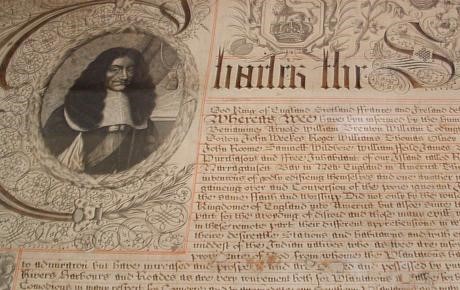 2013 is the 350th anniversary celebration of the Rhode Island Royal Charter.
2013 is the 350th anniversary celebration of the Rhode Island Royal Charter.
Dated July 8, 1663, it was drafted by Dr. John Clarke of Newport. Clarke worked for over a decade to secure the charter from England’s King Charles II who finally granted establishing the “Colony of Rhode Island & Providence Plantations.” The document uniquely guaranteed a “freedom of religious concernments” for its citizens. But it is the definition and requirements of full citizenship that lead to murky circumstances for non-Protestant Christians.
With the properly received attention and recognition of Rhode Island’s Charter and its provisions for religious toleration and freedom, what has been lost in history is that in fact, the charter offered religious and civil freedoms only if you were a Protestant Christian. In early Rhode Island, religious toleration was afforded to all and it was lawful for those of differing religious beliefs than the dominant Protestant Christians to practice their religion freely, but these same groups could not participate as full citizens in civic affairs, including holding public office or voting.
In 1762, just about 100 years after the original charter, Jewish businessmen Aaron Lopez and Isaac Elizer of Newport petitioned to become naturalized citizens within the colony, but were turned down not once, but twice by the Rhode Island Superior Court. The court’s rationale was, “Further by the charter granted to this colony, it appears that the free and quiet enjoyment of the Christian religion and a desire of propagating the same were the principal views with which this colony was settled, and by a law made and passed in the year 1663, no person who does not profess the Christian religion can be admitted free that is, as a voter or office holder to this colony.”
Ironically, while Rhode Island and America would soon go to war with Great Britain over “taxation without representation,” the entire class of Jewish Newport civic, business and community leaders were unequivocally disenfranchised because of their religious beliefs, highlighted by Lopez who was one of Newport’s top taxpayers, employers and commerce leaders at the time.
Interestingly, Lopez’s cousin, James Lucena would arrive in Newport from Lisbon, Portugal in 1769 and bring with him the patent and technology to manufacture “Castilian” soap. Unlike his cousin Aaron who dropped the pretense of being a Catholic Christian and openly pronounced his faith as a Hebrew, Lucena pronounced his faith as a Christian in the Episcopalian faith and was quickly admitted as a naturalized citizen in the Colony of Rhode Island.
Immediately after the American Revolution, the Jewish community of Newport led the effort to remove this religious limitation nationally through a letter to newly elected President George Washington in August of 1790 by the Warden of the Newport Hebrew Congregation, Moses Sexias stating, “Deprived as we heretofore have been of the invaluable rights of free Citizens, we now (with a deep sense of gratitude to the Almighty disposer of all events) behold a Government, erected by the Majesty of the People–a Government, which to bigotry gives no sanction, to persecution no assistance–but generously affording to All liberty of conscience, and immunities of Citizenship: deeming every one, of whatever Nation, tongue, or language, equal parts of the great governmental Machine.” President Washington responded to the Newport group with his own letter supporting their full rights as citizens of the fledging United States, but also stressing that “All possess alike liberty of conscience and immunities of citizenship It is now no more that toleration is spoken of, as if it was by the indulgence of one class of people, that another enjoyed the exercise of their inherent natural rights.”
These sentiments by our first President and members one of America’s earliest Jewish communities would later be reflected in the important First Amendment of the Bill of Rights in 1791 that, “Congress shall make no law respecting an establishment of religion, or prohibiting the free exercise thereof.”
It would not be until the 1843 Rhode Island Constitution that true freedom of religion enjoined with open citizenship would be in place for all Rhode Islanders.
-KS
- TO BE SOLD: African Slave Advertisements in Colonial Newport - December 4, 2014
- A Woman of Valor - October 3, 2014
- Preparing for Conflict Overseas and at Home - August 29, 2014